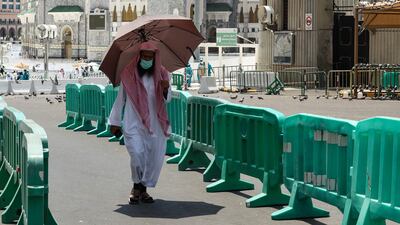Follow the latest updates on Hajj 2021 here
The General Presidency for the Affairs of the Two Holy Mosques distributed on Friday 12,000 umbrellas to worshippers and workers at the Grand Holy Mosque to protect them from heat before Hajj this year, the Saudi Press Agency (SPA) reported.
Hajj officially begins on July 18 and is limited to 60,000 pilgrims this year. Hajj pilgrims in Jeddah told The National they started receiving Hajj supplies from their Hajj and Umrah companies on Wednesday.
The supplies include an ihram, two white unstitched sheets worn by men during Hajj, and a carry-on bag for pilgrims to pack essentials such as clothes and utility items for the pilgrimage. Each pilgrim is only allowed one bag measuring up to 60 x 40 centimetres.
“I was so excited to receive this surprise. I didn’t know we would get a suitcase and ihram before we go on Hajj,” said Ms Fatemah, a Syrian resident in Jeddah.
The Ministry of Hajj and Umrah said “technical capabilities” were used to provide an innovative model for high-quality services for pilgrims this year.
Among these models is the ihram treated with silver nanotechnology, created by Saudi inventor Hamad bin Ali Al Yami, which will be used in the Hajj season for the second year in a row.
The ihram uses a cotton fabric that prevents the reproduction of bacteria and it holds an International Quality Certificate (ISO) as well as a certificate of recognition from SGS Germany.
The ihram aims to limit the transmission of infection among pilgrims, especially since it is worn for a long period of time during rituals and is extremely crucial for personal hygiene.
Mr Al Yami told SPA that one of the assets of silver nanotechnology is that it is used globally to sterilise surgical tools and in scrubs for doctors and medical teams in hospitals.
“What encouraged me the most was when King Salman’s Institute for Hajj and Umrah Research in 2008 conducted an experiment that relied on nanotechnology in the manufacture of antibacterial, anti-fungal and antiviral materials to disinfect carpets in the Two Holy Mosques and the covering of the Kaaba. It showed great results and helped reducing microbial growth,” Mr Al Yami said.
The Ministry of Hajj and Umrah on Friday stopped issuing prayer permits in the Grand Mosque in preparation for Hajj.
The Ministry of Islamic Affairs has assigned 135 scholars and imams to offer religious guidance to pilgrims and the Assistant Agency for Women’s Administrative and Service Affairs announced that it is ready to receive pilgrims with a force of 775 female workers.










